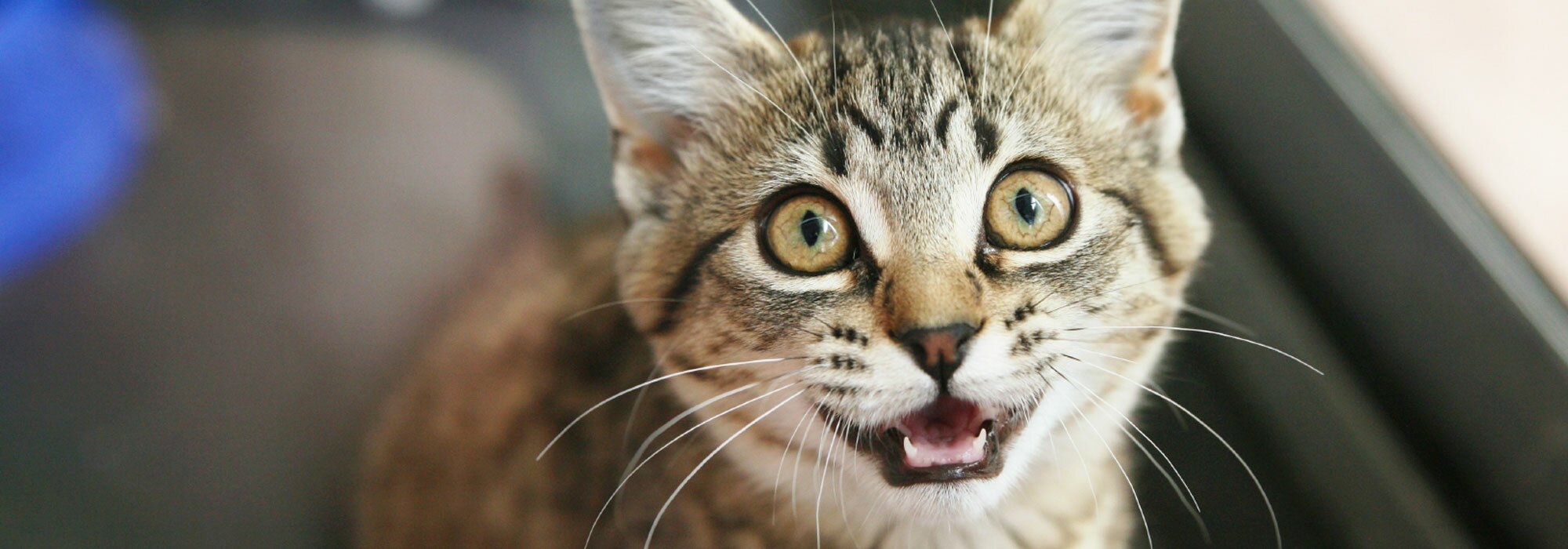
Is your cat meowing too much? While you may enjoy having occasional “conversations” with your cat, when they are meowing a lot it can be aggravating. However, there is usually a reason for the excessive meowing. It could even be something serious that warrants your attention, so if your kitty is talking up a storm, you need to find out why. Then you can figure out what you can do to take the vocalising down a notch.
Here are 8 reasons a cat might be meowing.
They’re Sick
Numerous illnesses can cause pain as well as extreme hunger, thirst, restlessness and anxiety. Meowing could be your kitty’s way of telling you he doesn’t feel so good and needs your help. Therefore, the first step is to have your cat checked by your veterinarian to rule out any medical conditions.
They Want Food
Some crafty cats quickly discover that meowing in the kitchen might result in a tasty tidbit from the human slave. If you give in to the meowing, they essentially train you, and will meow anytime you even think about fixing yourself a snack. Likewise, if they free feed and the kibble bowl is empty, most cats are sure to let you know about it. If you feed them breakfast as soon as your feet hit the floor in the morning, they also learn that meowing at you while you’re “sleeping in” – which to them could be 4 a.m. – might encourage you to get your lazy self out of bed. To quiet down a cat meowing for food, you essentially have to retrain them, i.e., don’t feed them when they demand food.
They Want Attention
I’m sure you’ve read how all cats are aloof and independent, and they’re perfectly fine being left alone all the time. Well…it’s simply not true. Felines do enjoy social contact with humans, and a bored or lonely cat will meow because they want you to play with them, pet them or just talk to them. One easy way to cut down on the attention-seeking meows is to spend more time with your cat! If you are away from home a lot, find ways to enrich your cat’s life—regularly swap out the toys, give her a tall cat condo to climb, install a window perch so she can watch “Squirrel TV” and put a bird feeder nearby.
They Have Feline Dementia
Like aging humans, senior cats can suffer from mental confusion or cognitive dysfunction syndrome (CDS). They might meow plaintively because they’re confused or disoriented, especially in the middle of the night (this is, appropriately, known as night calling). CDS may also be related to a decline in hearing.
They’re In the Mood (for Love)
Cats that are not spayed or neutered will meow when they want to find a mate. When she’s in heat, a female cat will yowl excessively to “advertise” to any males within earshot. Male kitties, in return, will meow when they get the message and when they smell a female in heat. The solution to this meowing is obvious – spay or neuter your pet.
They’re a Talkative Breed
Some cat breeds are known to be quite the little chatterbox. This includes the Siamese, Tonkinese, Oriental, Singapura and Siberian. This trait just comes naturally to these breeds, so there’s not much you can do to curb the behavior other than to choose wisely at adoption time.
They’re Stressed
Cats that are experiencing stress are apt to become more vocal. Felines typically aren’t fond of sudden changes to their routine, and they may meow a lot to express their disapproval or anxiety. Changes that could turn your kitty into a Chatty Cathy include adopting a new pet, a baby, moving to a new home, loud noises (construction next door, a teenage rock band in the basement) missing a human companion who leaves (divorce, business trip, going back to school). If you know what’s causing your cat stress and can alleviate it, great. If not, try to give them extra attention to help them adjust to the new normal.
They’re Just Sayin’ Hi
Sometimes, a meow is just a greeting. If your cat meets you at the door and meows nonstop, consider yourself lucky – she’s just telling you that she loves you and she’s happy you’re home!
by Julia Williams
